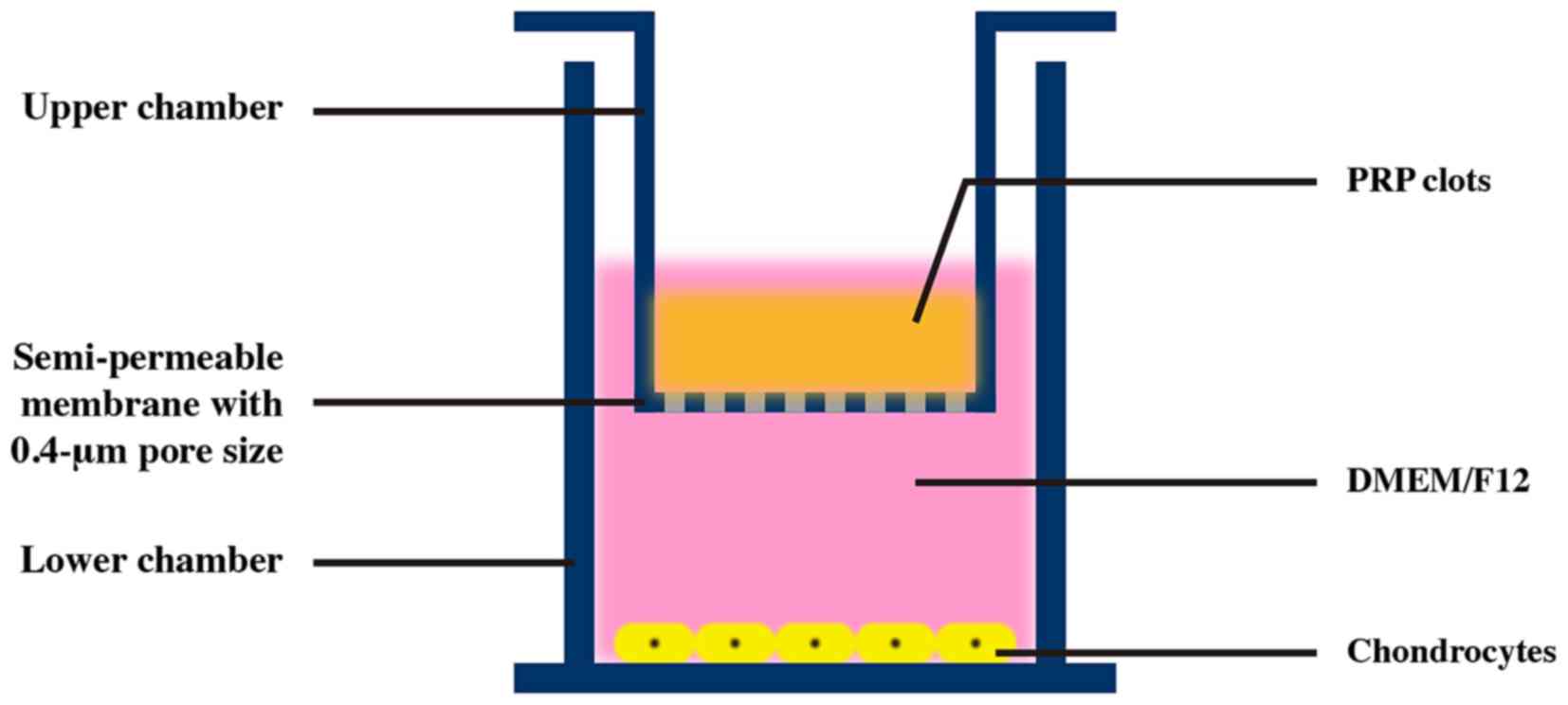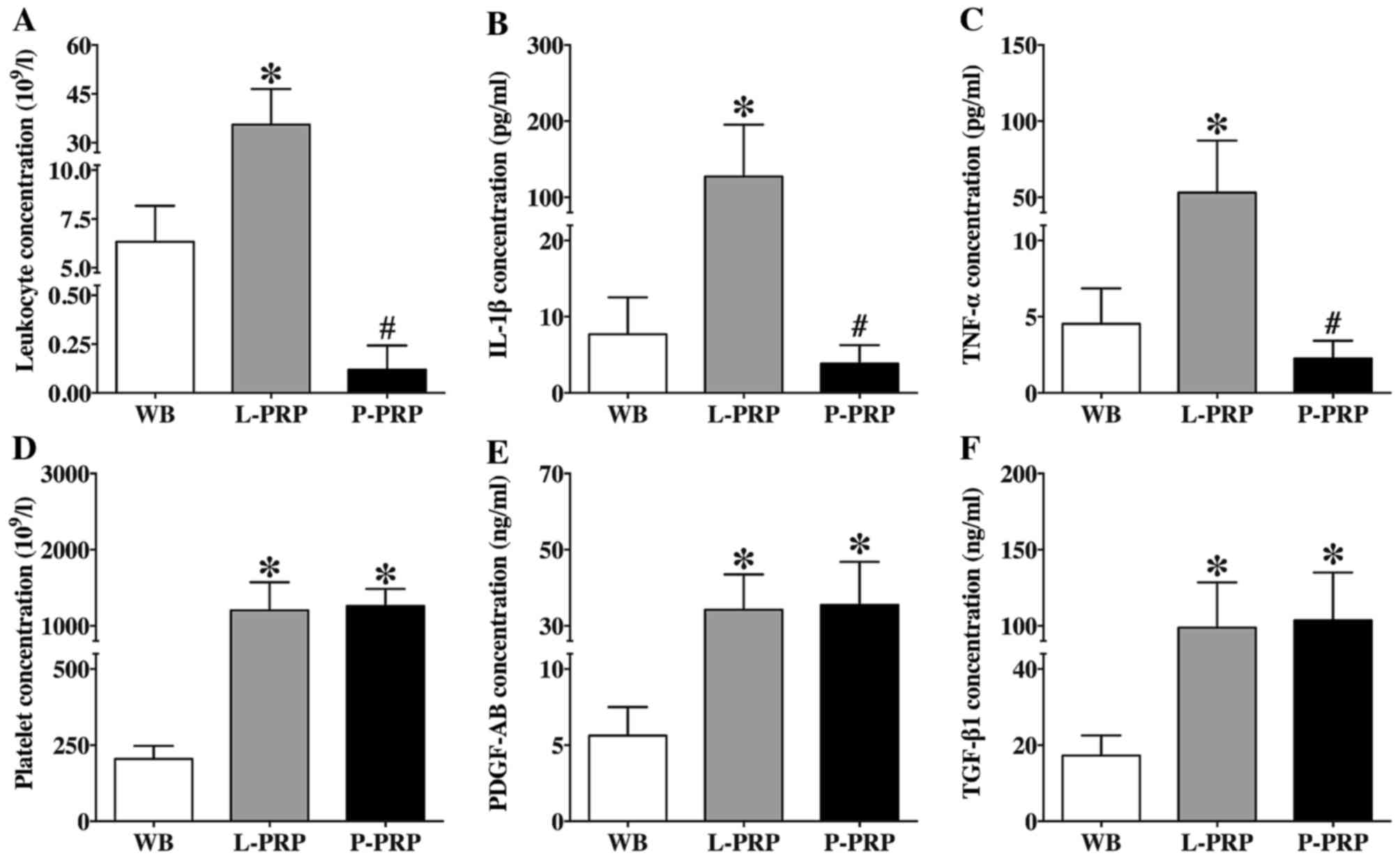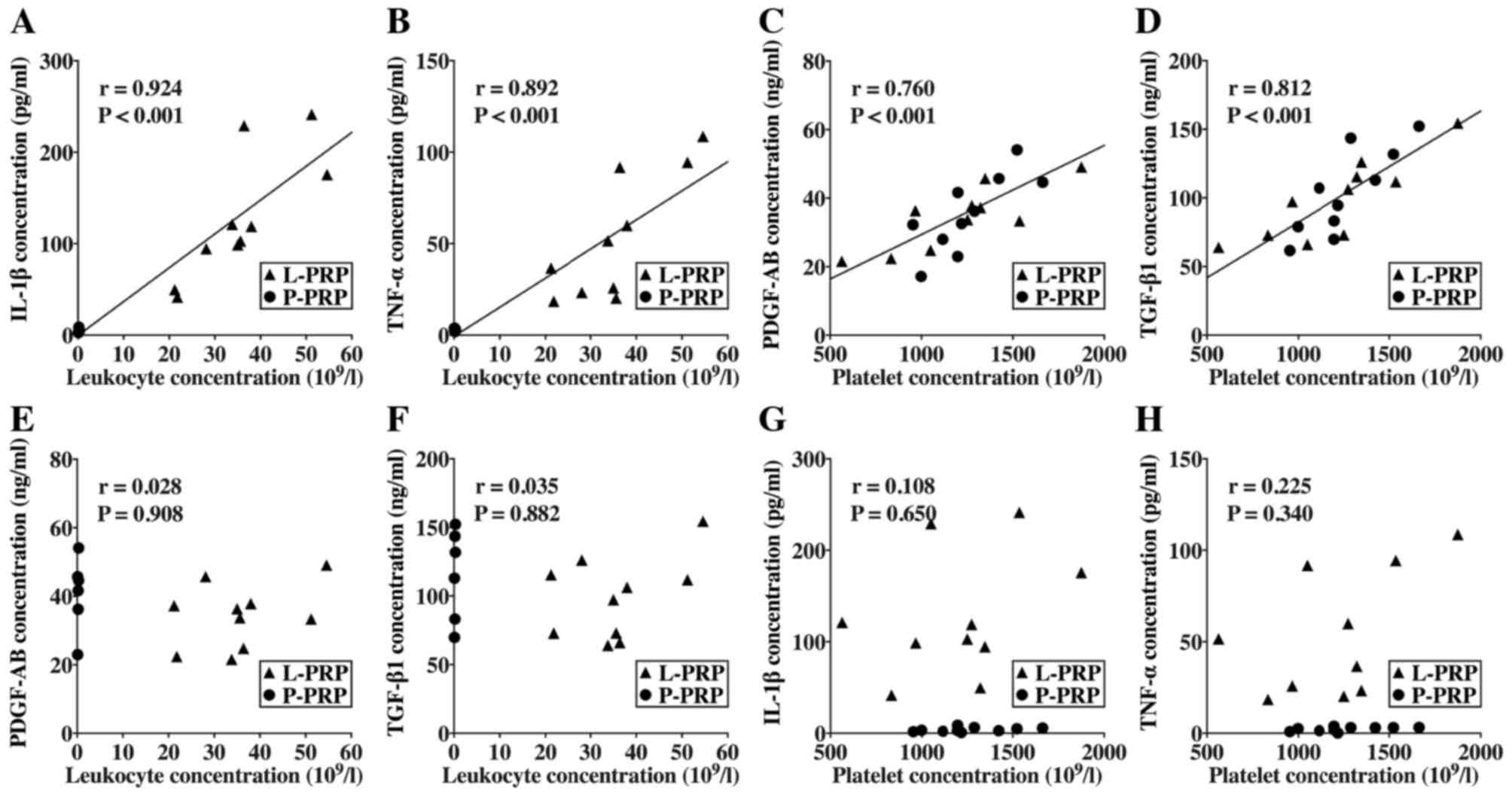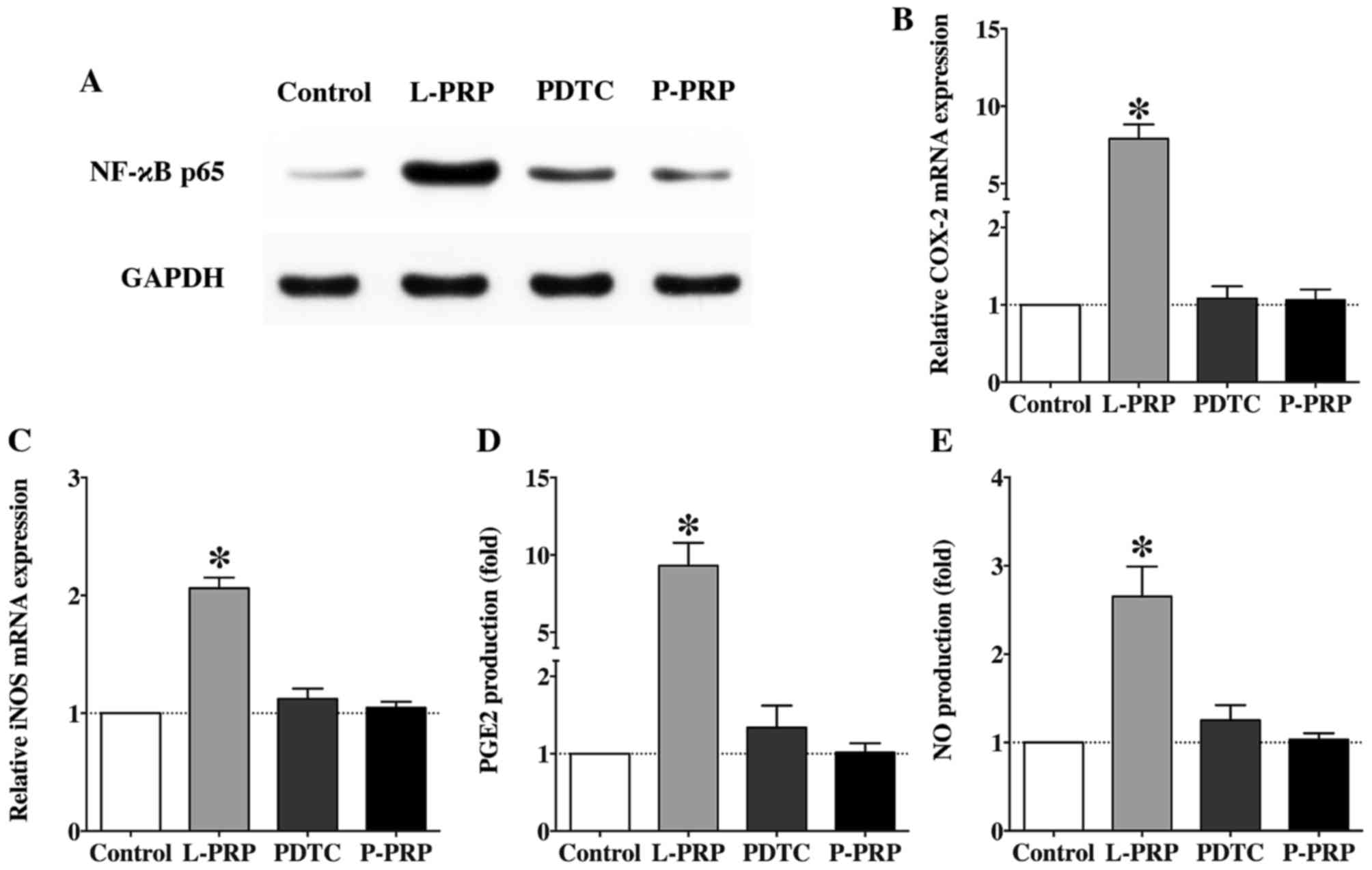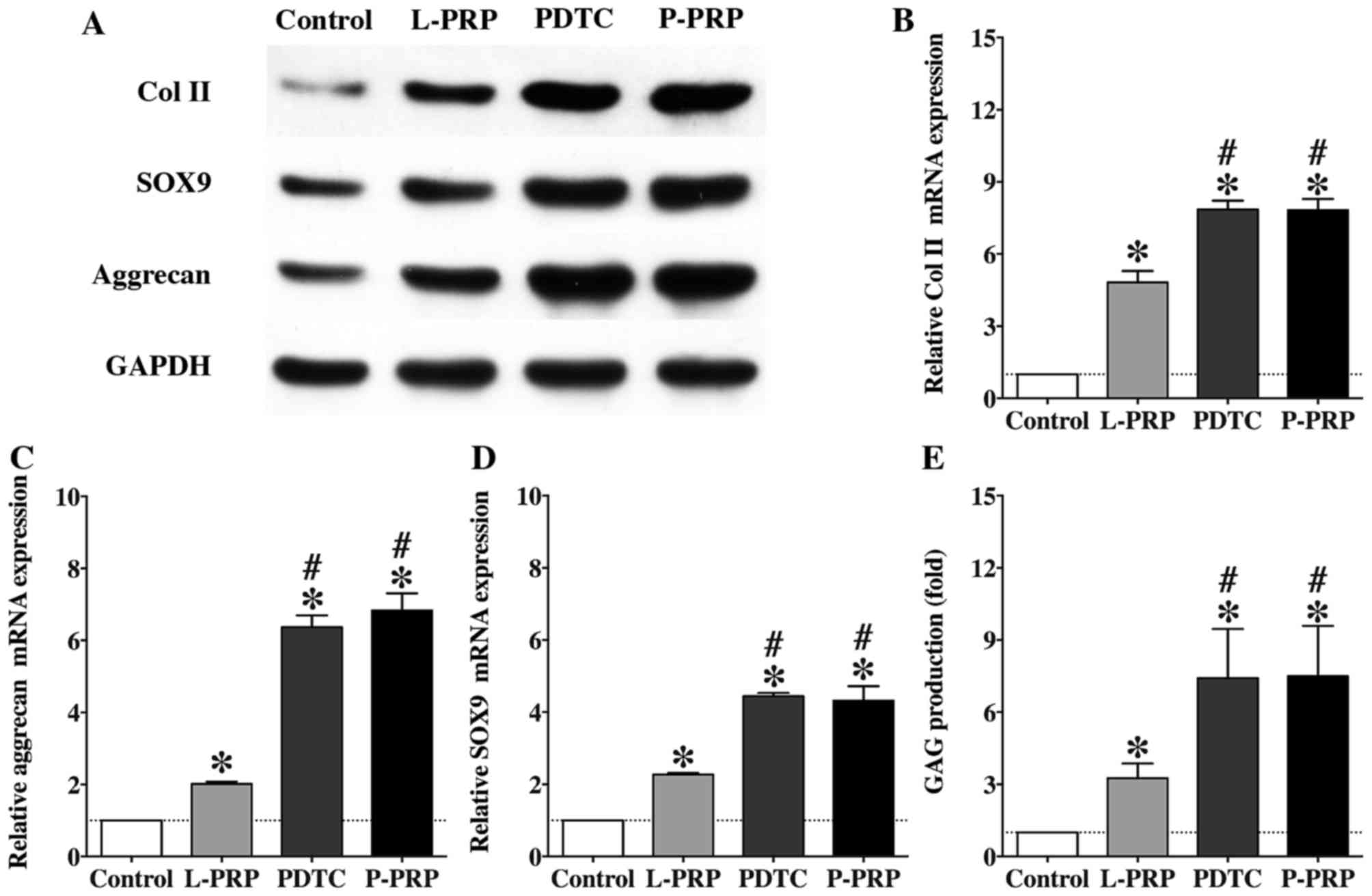|
1
|
Woolf AD and Pfleger B: Burden of major
musculoskeletal conditions. Bull World Health Organ. 81:646–656.
2003.PubMed/NCBI
|
|
2
|
FitzGerald GA and Patrono C: The coxibs,
selective inhibitors of cyclooxygenase-2. N Engl J Med.
345:433–442. 2001. View Article : Google Scholar : PubMed/NCBI
|
|
3
|
Altman RD and Moskowitz R: Intraarticular
sodium hyaluronate (Hyalgan) in the treatment of patients with
osteoarthritis of the knee: a randomized clinical trial. Hyalgan
Study Group. J Rheumatol. 25:2203–2212. 1998.PubMed/NCBI
|
|
4
|
Muir H: The chondrocyte, architect of
cartilage. Biomechanics, structure, function and molecular biology
of cartilage matrix macromolecules. Bioessays. 17:1039–1048. 1995.
View Article : Google Scholar : PubMed/NCBI
|
|
5
|
Castillo TN, Pouliot MA, Kim HJ and Dragoo
JL: Comparison of growth factor and platelet concentration from
commercial platelet-rich plasma separation systems. Am J Sports
Med. 39:266–271. 2011. View Article : Google Scholar : PubMed/NCBI
|
|
6
|
Magalon J, Bausset O, Serratrice N,
Giraudo L, Aboudou H, Veran J, Magalon G, Dignat-Georges F and
Sabatier F: Characterization and comparison of 5 platelet-rich
plasma preparations in a single-donor model. Arthroscopy.
30:629–638. 2014. View Article : Google Scholar : PubMed/NCBI
|
|
7
|
Kon E, Mandelbaum B, Buda R, Filardo G,
Delcogliano M, Timoncini A, Fornasari PM, Giannini S and Marcacci
M: Platelet-rich plasma intra-articular injection versus hyaluronic
acid viscosupplementation as treatments for cartilage pathology:
From early degeneration to osteoarthritis. Arthroscopy.
27:1490–1501. 2011. View Article : Google Scholar : PubMed/NCBI
|
|
8
|
Filardo G, Kon E, Buda R, Timoncini A, Di
Martino A, Cenacchi A, Fornasari PM, Giannini S and Marcacci M:
Platelet-rich plasma intra-articular knee injections for the
treatment of degenerative cartilage lesions and osteoarthritis.
Knee Surg Sports Traumatol Arthrosc. 19:528–535. 2011. View Article : Google Scholar : PubMed/NCBI
|
|
9
|
Ehrenfest Dohan DM, Rasmusson L and
Albrektsson T: Classification of platelet concentrates: From pure
platelet-rich plasma (P-PRP) to leucocyte- and platelet-rich fibrin
(L-PRF). Trends Biotechnol. 27:158–167. 2009. View Article : Google Scholar : PubMed/NCBI
|
|
10
|
Sundman EA, Cole BJ and Fortier LA: Growth
factor and catabolic cytokine concentrations are influenced by the
cellular composition of platelet-rich plasma. Am J Sports Med.
39:2135–2140. 2011. View Article : Google Scholar : PubMed/NCBI
|
|
11
|
Burguera EF, Vela-Anero A, Magalhaes J,
Meijide-Failde R and Blanco FJ: Effect of hydrogen sulfide sources
on inflammation and catabolic markers on interleukin 1β-stimulated
human articular chondrocytes. Osteoarthritis Cartilage.
22:1026–1035. 2014. View Article : Google Scholar : PubMed/NCBI
|
|
12
|
Campbell KA, Minashima T, Zhang Y, Hadley
S, Lee YJ, Giovinazzo J, Quirno M and Kirsch T: Annexin A6
interacts with p65 and stimulates NF-kB activity and catabolic
events in articular chondrocytes. Arthritis Rheum. 65:3120–3129.
2013. View Article : Google Scholar : PubMed/NCBI
|
|
13
|
Altman R, Asch E, Bloch D, Bole G,
Borenstein D, Brandt K, Christy W, Cooke TD, Greenwald R, Hochberg
M, et al: Development of criteria for the classification and
reporting of osteoarthritis. Classification of osteoarthritis of
the knee. Diagnostic and therapeutic criteria committee of the
American rheumatism association. Arthritis Rheum. 29:1039–1049.
1986. View Article : Google Scholar : PubMed/NCBI
|
|
14
|
Cavallo C, Filardo G, Mariani E, Kon E,
Marcacci M, Ruiz Pereira MT, Facchini A and Grigolo B: Comparison
of platelet-rich plasma formulations for cartilage healing: An in
vitro study. J Bone Joint Surg Am. 96:423–429. 2014. View Article : Google Scholar : PubMed/NCBI
|
|
15
|
Zhu H, Cheng X, Niu X, Zhang Y, Guan J,
Liu X, Tao S, Wang Y and Zhang C: Proton-sensing GPCR-YAP
signalling promotes cell proliferation and survival. Int J Biol
Sci. 11:1181–1189. 2015. View Article : Google Scholar : PubMed/NCBI
|
|
16
|
Zhi Y, Duan Y, Zhou X, Yin X, Guan G,
Zhang H, Dong Q and Yang K: NF-kB signaling pathway confers
neuroblastoma cells migration and invasion ability via the
regulation of CXCR4. Med Sci Monit. 20:2746–2752. 2014. View Article : Google Scholar : PubMed/NCBI
|
|
17
|
Mladenova D, Pangon L, Currey N, Ng I,
Musgrove EA, Grey ST and Kohonen-Corish MR: Sulindac activates
NF-kB signaling in colon cancer cells. Cell Commun Signal.
11:732013. View Article : Google Scholar : PubMed/NCBI
|
|
18
|
de Mos M, van der Windt AE, Jahr H, van
Schie HT, Weinans H, Verhaar JA and van Osch GJ: Can platelet-rich
plasma enhance tendon repair? A cell culture study. Am J Sports
Med. 36:1171–1178. 2008. View Article : Google Scholar : PubMed/NCBI
|
|
19
|
McCarrel T and Fortier L: Temporal growth
factor release from platelet-rich plasma, trehalose lyophilized
platelets, and bone marrow aspirate and their effect on tendon and
ligament gene expression. J Orthop Res. 27:1033–1042. 2009.
View Article : Google Scholar : PubMed/NCBI
|
|
20
|
Xie X, Wang Y, Zhao C, Guo S, Liu S, Jia
W, Tuan RS and Zhang C: Comparative evaluation of MSCs from bone
marrow and adipose tissue seeded in PRP-derived scaffold for
cartilage regeneration. Biomaterials. 33:7008–7018. 2012.
View Article : Google Scholar : PubMed/NCBI
|
|
21
|
Livak KJ and Schmittgen TD: Analysis of
relative gene expression data using real-time quantitative PCR and
the 2(−Delta Delta C(T)) Method. Methods. 25:402–408. 2001.
View Article : Google Scholar : PubMed/NCBI
|
|
22
|
Heldin CH, Eriksson U and Ostman A: New
members of the platelet-derived growth factor family of mitogens.
Arch Biochem Biophys. 398:284–290. 2002. View Article : Google Scholar : PubMed/NCBI
|
|
23
|
Yaeger PC, Masi TL, de Ortiz JL, Binette
F, Tubo R and McPherson JM: Synergistic action of transforming
growth factor-beta and insulin-like growth factor-I induces
expression of type II collagen and aggrecan genes in adult human
articular chondrocytes. Exp Cell Res. 237:318–325. 1997. View Article : Google Scholar : PubMed/NCBI
|
|
24
|
Stewart K, Pabbruwe M, Dickinson S, Sims
T, Hollander AP and Chaudhuri JB: The effect of growth factor
treatment on meniscal chondrocyte proliferation and differentiation
on polyglycolic acid scaffolds. Tissue Eng. 13:271–280. 2007.
View Article : Google Scholar : PubMed/NCBI
|
|
25
|
Berg U, Gustafsson T, Sundberg CJ,
Carlsson-Skwirut C, Hall K, Jakeman P and Bang P: Local changes in
the insulin-like growth factor system in human skeletal muscle
assessed by microdialysis and arterio-venous differences technique.
Growth Horm IGF Res. 16:217–223. 2006. View Article : Google Scholar : PubMed/NCBI
|
|
26
|
Saklatvala J: Tumour necrosis factor alpha
stimulates resorption and inhibits synthesis of proteoglycan in
cartilage. Nature. 322:547–549. 1986. View
Article : Google Scholar : PubMed/NCBI
|
|
27
|
Henderson B and Pettipher ER:
Arthritogenic actions of recombinant IL-1 and tumour necrosis
factor alpha in the rabbit: Evidence for synergistic interactions
between cytokines in vivo. Clin Exp Immunol. 75:306–310.
1989.PubMed/NCBI
|
|
28
|
Bacconnier L, Jorgensen C and Fabre S:
Erosive osteoarthritis of the hand: Clinical experience with
anakinra. Ann Rheum Dis. 68:1078–1079. 2009. View Article : Google Scholar : PubMed/NCBI
|
|
29
|
Grunke M and Schulze-Koops H: Successful
treatment of inflammatory knee osteoarthritis with tumour necrosis
factor blockade. Ann Rheum Dis. 65:555–556. 2006. View Article : Google Scholar : PubMed/NCBI
|
|
30
|
Davidson RK, Jupp O, de Ferrars R, Kay CD,
Culley KL, Norton R, Driscoll C, Vincent TL, Donell ST, Bao Y and
Clark IM: Sulforaphane represses matrix-degrading proteases and
protects cartilage from destruction in vitro and in vivo. Arthritis
Rheum. 65:3130–3140. 2013. View Article : Google Scholar : PubMed/NCBI
|
|
31
|
Pereira RC, Scaranari M, Benelli R, Strada
P, Reis RL, Cancedda R and Gentili C: Dual effect of platelet
lysate on human articular cartilage: A maintenance of chondrogenic
potential and a transient proinflammatory activity followed by an
inflammation resolution. Tissue Eng Part A. 19:1476–1488. 2013.
View Article : Google Scholar : PubMed/NCBI
|
|
32
|
van Buul GM, Koevoet WL, Kops N, Bos PK,
Verhaar JA, Weinans H, Bernsen MR and van Osch GJ: Platelet-rich
plasma releasate inhibits inflammatory processes in osteoarthritic
chondrocytes. Am J Sports Med. 39:2362–2370. 2011. View Article : Google Scholar : PubMed/NCBI
|
|
33
|
Pujol JP, Chadjichristos C, Legendre F,
Bauge C, Beauchef G, Andriamanalijaona R, Galera P and Boumediene
K: Interleukin-1 and transforming growth factor-beta 1 as crucial
factors in osteoarthritic cartilage metabolism. Connect Tissue Res.
49:293–297. 2008. View Article : Google Scholar : PubMed/NCBI
|
|
34
|
Rédini F, Mauviel A, Pronost S, Loyau G
and Pujol JP: Transforming growth factor beta exerts opposite
effects from interleukin-1 beta on cultured rabbit articular
chondrocytes through reduction of interleukin-1 receptor
expression. Arthritis Rheum. 36:44–50. 1993. View Article : Google Scholar : PubMed/NCBI
|
|
35
|
Millan MJ: The induction of pain: An
integrative review. Prog Neurobiol. 57:1–164. 1999. View Article : Google Scholar : PubMed/NCBI
|
|
36
|
Tegeder I, Niederberger E, Schmidt R, Kunz
S, Guhring H, Ritzeler O, Michaelis M and Geisslinger G: Specific
Inhibition of IkappaB kinase reduces hyperalgesia in inflammatory
and neuropathic pain models in rats. J Neurosci. 24:1637–1645.
2004. View Article : Google Scholar : PubMed/NCBI
|















